Dental Implants
Are you missing one or multiple teeth? Are you needing full reconstruction of a dental arch? Dental implants can improve your confidence and oral health. The innovations of modern-implant dentistry provide the best options when replacing natural teeth. No other tooth-replacement option provides better results.
Additionally, dental implants help preserve tooth-supporting bone, which naturally begins to deteriorate after losing a tooth. This bone loss is a serious and unseen consequence if lost teeth go untreated.
At our dentist office, Dr. Sjogren provides the implant-dentistry expertise and knowledge to answer your questions - providing you with dental implant options, surgery details, and additional information while you research. The implants we provide are excellent and have a documented success rate of 95-98%.
Find more information on these dental implant topics below:
What are Dental Implants?
The Procedure & How Implants Work
Types of Implants
Dental Implant Costs
Care & Maintenance
What Are Dental Implants?
A dental implant (also known as an endosseous implant or fixture) consists of three main components: a medical-grade titanium implant fixture, an implant abutment, and a manufactured crown or bridge. The actual implanted device takes the form of a small, screw-shaped titanium post that functions as the root of a tooth. This implant is screwed into your bone, where it and the bone eventually fuse together.
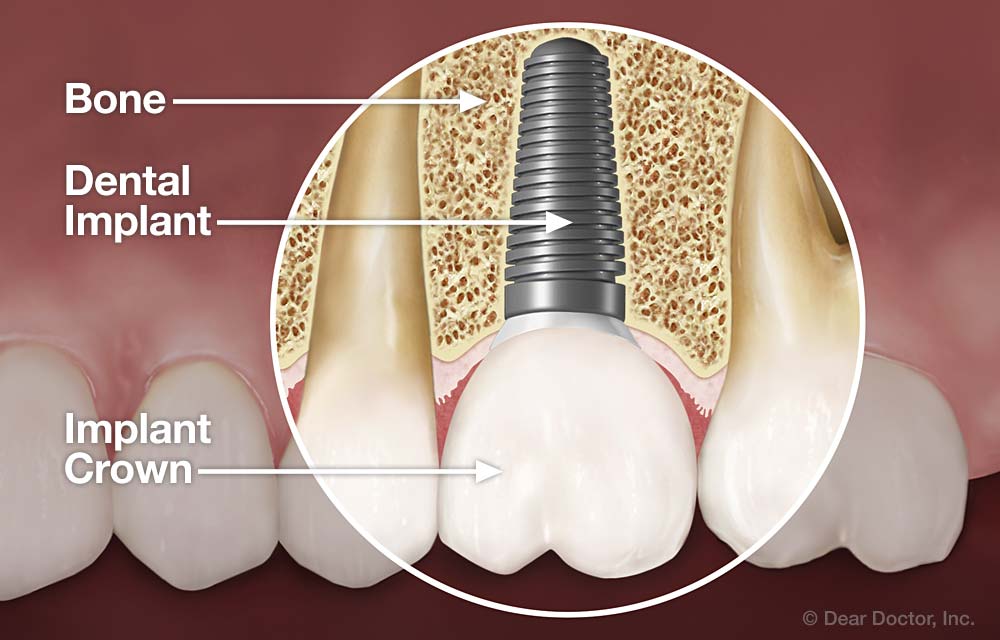
Attached on top of the post is a titanium abutment, which partially nests inside the implant and is fixed to the with a small surgical bolt. This abutment connects and supports the new tooth to the implanted fixture. The final piece of an implant is the dental prosthesis. Our crowns and bridges are manufactured using computer-aided design and manufacturing with CEREC 3D technology. They are precision measured and made to fit and look as natural as your other teeth. The result both looks and feels great while durable and made to last a lifetime.
The Procedure & How Implants Work
Dental implant surgery occurs during minimally-invasive and outpatient appointments. The actual procedure begins with applying anesthesia, cleaning, and preparing the tooth area. Then, a small incision is made in the gum where a hole is drilled, allowing the titanium fixture to be implanted directly into the jawbone. This procedure is actually quite minor, routine, and in most cases, requires only local anesthesia. The implant is then capped and the gums are given time to heal. After this healing period, the cap is lifted, allowing the abutment to be placed and seated snuggly inside the healed gum line. During the final step, the implant is topped with a crown (or bridge), custom-made to match your existing and natural teeth. When finally set, your new crown or bridge is the only component visible above the gum line.
Types of Implants
Implants can replace missing teeth in a variety of ways. They can be used to:
Replace One Tooth
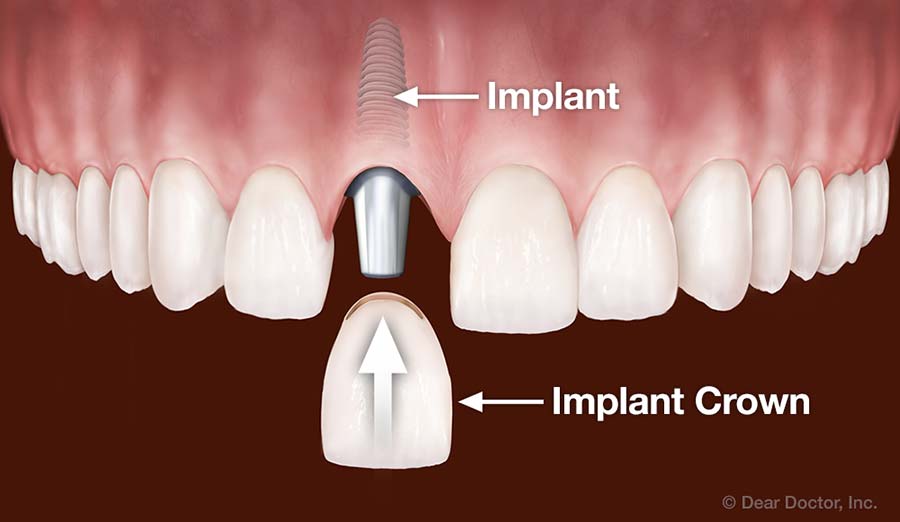
When you have one tooth missing, a single implant is inserted into the bone to replace the root part of that tooth; a crown then goes on top to simulate an actual tooth. This treatment choice has the highest success rate, making it the best long-term investment for replacing a single missing tooth. Even if the initial cost is slightly higher than other options, it is the most cost-effective solution over time. An implant will never decay or need root canal treatment and feels just like the tooth that was there.
Replace Multiple Teeth
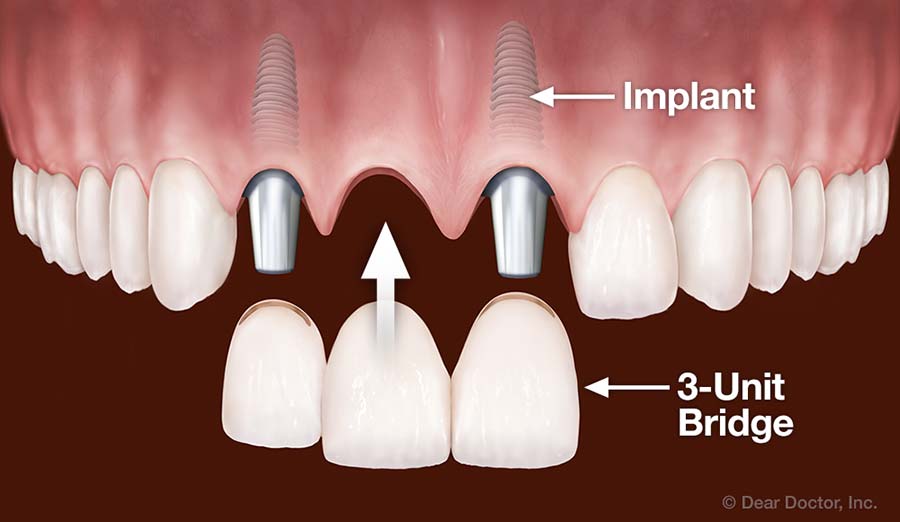
When you have more than one tooth missing, implants provide an ideal replacement mechanism. You don't even need one implant for every missing tooth. Instead, implant teeth can act as supports for fixed bridgework. For example, if you are missing three teeth in a row, we can place two implants, one on either side of the gap, and a crown in between that has no implant underneath. That way, you won't need to use any of your remaining natural teeth as bridge supports, which could weaken them and make them more susceptible to decay.
Replace All Teeth
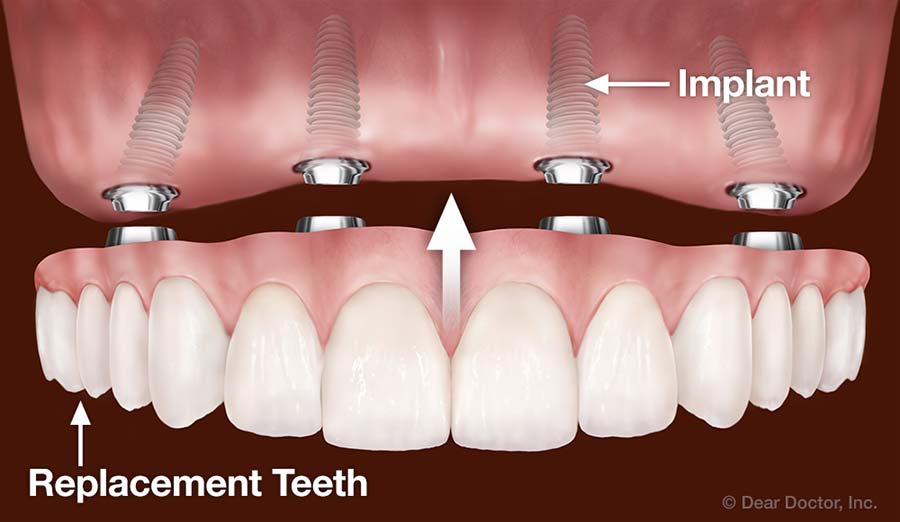
Implants can support an entire arch of upper or lower replacement teeth that are fixed into the mouth and are never removed. Sometimes the new teeth can be supported by as few as 4 implants. It's comparable to the structure of a table, which only needs 4 legs to hold it up. In cases where jawbone density and volume have deteriorated, 5 or 6 implants might be needed to support a row of 10 to 12 teeth. Dental implant replacement teeth protect your jawbone, won't slip, and should last a lifetime.
Dental Implant Costs
Many factors go into the bottom-line number for the cost of dental implants. Before asking, ‘How much do dental implants cost?' consider these 2 scenarios:
Patient A has a single, front tooth that is damaged beyond repair and will be replaced with a dental implant. The injury occurred recently and there is no jaw bone loss.
Patient B lost 2 molars a few years ago. There has been some gum recession and bone decay occurring as well. Patient B requires 2 dental implants and additional implant surgery appointments.
These two patients will see very different dental implant costs. Each patient requires a unique treatment plan. It becomes difficult to offer an exact cost for dental implants without a consultation to address each patient's situation individually.
Here are some factors that affect the costs of dental implants:
- The number of appointments required
- How extensive the procedures are
- The type of dental implant to be used
- Your personal dental insurance coverage and benefits
At Show Your Grin Dental, we have a variety of options to address these points.
- A dental implant consultation with Dr. Sjogren will determine the best approach for treatment.
- This consultation also determines how extensive the appointment(s) will be.
- With more information about the procedure and types of dental implants available, our team can develop a dental-procedure plan.
- By working with our Dental Insurance Specialists, we'll identify what your personal insurance plan is able to cover and create an estimate for the remaining dental implant cost.
The American Academy of Implant Dentistry also provides an answer to the question, "Will my insurance cover dental implant costs?" Their website provides this answer:
"Recognizing the long-term patient benefits over other treatment options, an increasing number of insurance companies have started providing some coverage. If yours doesn't, ask them if they will give you an allowance towards dental implants equal to the cost of a bridge or traditional dentures. Also, ask your implant dentist about financing and payment options."
For more information about your insurance coverage, please visit our Finance & Insurance page or Contact Us at the office with questions. Show Your Grin Dental provides in-house financing and accepts financing from CareCredit and Wells Fargo Advantage.
Caveat Emptor (Let the buyer beware…)
When considering dental implants, their costs, and providers, be cautious of low-cost deals. Dental implants are extremely durable and often will last for the rest of your life. It is important to research and contact a reputable dental implant specialist to discuss everything from options, procedures, and costs to receive high-quality dental implants and professional patient care. As the old adage goes, "If it sounds too good to be true…" If you're still searching for that dollar amount for dental implant costs, the Dental Implant Center out of Dallas mentions on their website that a single dental implant can cost between $1,000 and $3000. Obviously, there is a great amount between the two costs and your actual cost for dental implants varies as much as the individual.
If you are prepared to move forward with dental implants, please schedule a free consultation with Dr. Sjogren or Dr. Silva and the Show Your Grin Dental team by calling our office or requesting an appointment online.
Care & Maintenance
There are only two ways an implant can lose attachment to the bone and fail once it has successfully fused. First is poor oral hygiene habits. Poor oral hygiene, including a lack of regular professional cleanings, may lead to a destructive bacterial infection called peri-implantitis. By flossing and brushing your teeth on a daily basis, along with regular dentist visits, this can easily be avoided. The second is excessive or extreme biting forces. These biting forces often come from either a habit of clenching or grinding your teeth, an insufficient number of implants to handle the forces generated by your bite, or the deliberate chomping on hard items. If you have a habit of grinding or clenching your teeth, a Night Guard will be recommended to protect your implants. Also, the correct number of fixtures should be implanted to support your new crowns and be careful when chewing hard foods like hard candies, seeds, and nuts. After all, dental implants are a lifelong investment in your smile, your health, and your well-being, and it's best to protect your investment.
Related Articles
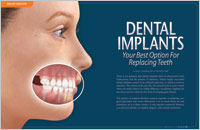
Dental Implants - Your Best Option For Replacing Teeth Dental implants have many advantages over older methods of tooth replacement like bridges and dentures — from the way they function and feel to the way they look and last. Vigorous research has documented and confirmed that in the right situations, dental implant success rates are over 95%. It is no exaggeration to say that they have revolutionized dentistry. They may even change your life... Read Article
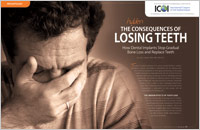
The Hidden Consequences of Losing Teeth For those missing even one tooth, an unsightly gap is actually the least significant problem. What's of far greater concern is the bone loss that inevitably follows tooth loss. Dental implants can preserve bone, improve function and enhance psychological well-being. Learn how implants serve both as anchors to support replacement teeth and preserve bone... Read Article
